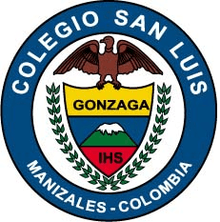St. Aloysius College, Manizales
| St. Aloysius College, Manizales Colegio San Luis | |
|---|---|
 | |
| Location | |
|
, Calle 54 nº 27-35 Manizales, Colombia | |
| Information | |
| Type | Jesuit, Catholic |
| Established | 1954[1] |
| Rector | Alvaro Velez Escobar, SJ |
| Director | Dora Patricia Galeano Ramirez |
| Staff | 133 |
| Grades | 2 preprimary through eleventh |
| Gender | Coeducational |
| Enrollment | 940 |
| Website | Gonzaga |
St. Aloysius College, Manizales, Colombia, (Colegio San Luis), was founded by the Society of Jesus in 1954 and has become coeducational, covering two years of kindergarten through grade 11 of high school.
History
The city of Manizales is in the coffee-growing area of Colombia, and has six universities. The Jesuits arrived in the city in 1930 and in 1954 opened St. Aloysius Gonzaga College with 69 students, primary to second year high school.[2] Construction began on the present school in 1955.
The 1960s saw the adoption of the "Gonzaga neighborhood" outreach program, and the beginnings of the Scout troop and Jesuit Alumni Association (ASIA).
The 1970s saw the initiation of personalized education and of coeducation in the primary division. The physical plant experienced damage in the 1979 Tumaco earthquake.
In the 1980s coeducation was extended throughout the College. The present preschool and high school buildings were completed.
The 1990s saw increased emphasis on the Jesuit and Ignatian characteristics of education at Gonzaga. Villa Gonzaga headquarters was acquired and the Coliseum[3] and the building for pastorals and Asogonzaga is built.
After 2000 the Centre for Educational Studies, Human Resources Management Area, and the legal department were created along with the Information and Technology Centre. Media training in radio and television begins. The reach of the College is extended through the Office of International and Institutional Relations.
Programs
Student welfare is a group of professionals responsible for the welfare of students, inspired by the Ignatian Spirituality and social consciousness, and sensitive to the diverse needs of the students.
Student government and the debate opportunities, along with the school gathering for flag raising, are seen as training in democratic citizenship.
Red Cross Brigade is trained and certified to respond to emergencies.
Workshop on Prevention of Substance Abuse, with police assistance, offers parents with their children a creative use for leisure time, with cultural, tourist, and environmental components. The experience includes a variety of destinations and learning experiences throughout the school year.
PRAGO (Environmental Project Gonzaga) introduces grades four through eleven to reflection on environmental issues, campaigns, and care for forests. Besides observing global celebrations, it currently cooperates with the Municipal Comptroller in the project "For a Clean School" and the "Arbolocos" Foundation, in a sponsorship program of native species.[4]
Folkloric Dance trains students in dance and folklore, the cultural, aesthetic, and playful, for integral development, with 350 students involved in grades three to eleven. It is crowned with the annual Colombian Night celebration.[5]
The College has also hosted national forums, as the one on Fernando Gonzalez and Estanislao Zuleta in April 2016, which found 16 schools in attendance.[6]
Sports and exchange
The school has athletic facilities for football, rama sports football, basketball, tennis,[7] track and field, volleyball, swimming, mountain biking, and nature trail. The English program has included an exchange with Bellarmine College Preparatory in San Jose, California, for two weeks, in the USA,[2] and currently includes a four weeks inter-cultural immersion at McGill University in Montreal, Canada.[8]
References
- ↑ La Patria. Accessed 31 July 2016.
- 1 2 FLACSI. Accessed 31 July 2016.
- ↑ El Tiempo on coliseum. Accessed 31 July 2016.
- ↑ National University on environmental program. Accessed 31 July 2016.
- ↑ Gonzaga. Accessed 31 July 2016.
- ↑ Philosophy forum. Accessed 31 July 2016.
- ↑ East Tennessee State tennis. Accessed 31 July 2016.
- ↑ McGill. Accessed 31 July 2016.
Coordinates: 5°3′31.55″N 75°29′52.37″W / 5.0587639°N 75.4978806°W